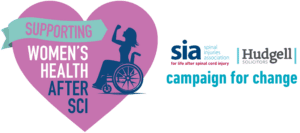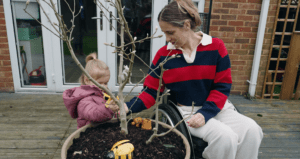Campaigning
Women's health campaign
Our women’s health campaign aims to highlight the unique challenges faced by disabled women and advocate for better healthcare solutions.

The challenges: Women’s health after spinal cord injury
Women with spinal cord injuries and other long-term conditions (such as multiple sclerosis, spina bifida, and Parkinson’s disease) face significant challenges in accessing the healthcare they need. Despite advancements in medical care and policy commitments to equality, too many women with disabilities continue to be excluded from mainstream health services, left navigating a system that fails to recognize and meet their unique needs.
The healthcare system is not designed with disabled women in mind. From inaccessible GP and hospital facilities to a lack of specialist knowledge among healthcare professionals, women with spinal cord injuries and other conditions often struggle to get the care they require.
Current health policies often fail to include or even acknowledge the specific needs of disabled women. Key gaps include:
- Routine procedures are frequently inaccessible, leaving women at higher risk of undetected health issues. Maternity and reproductive care also remain inadequate, with many women being discouraged from having children or facing serious risks due to a lack of appropriate medical support.
- A lack of integrated care pathways that consider both disability and gender-specific health needs.
- Inconsistent access to essential services, such as physiotherapy, mental health support, and specialist gynaecological care.
- A shortage of trained professionals who understand how to support disabled women in areas such as contraception, pregnancy, menopause, and routine screenings.
- Barriers to early diagnosis and treatment, especially for conditions like osteoporosis, uterine prolapse, and pressure ulcers, which disproportionately impact women with mobility impairments.

Women’s health is a critical aspect of overall well-being, and it becomes even more essential for women with spinal cord injuries (SCI). Here are some key points to consider:
- Limited access to breast screening equipment – One significant issue is the limited access to breast screening equipment. Traditional mammography machines often require women to stand or position themselves in ways that are not feasible for wheelchair users. This limitation can lead to delayed or missed breast cancer screenings, which are crucial for early detection and treatment.
- Inspection platforms in Doctor’s surgeries – Another challenge is the inadequate inspection platforms in many doctor’s surgeries. These platforms are often fixed at a height that makes it difficult for wheelchair users to transfer onto them. This can result in incomplete or less thorough examinations, potentially missing critical health issues.
- Additional challenges and considerations – Beyond these specific issues, women with SCI face a range of other health challenges: Sexual and Reproductive health: Women with SCI often experience sexual dysfunction and may have limited access to sexual health education and resources. This can impact their overall quality of life and relationships. Mental health: The psychological impact of living with SCI can be profound, leading to higher rates of depression and anxiety. Access to mental health support is crucial.
- Advocacy and solutions – We are working to address these issues through advocacy and education. By raising awareness of the unique health needs of women with SCI, we aim to improve access to appropriate healthcare services and equipment. This includes advocating for more accessible breast screening options and adjustable inspection platforms in medical facilities.
Addressing these issues requires more than just small-scale adjustments, it demands systemic change across government
departments, the NHS, and local authorities. Disabled women’s health must be embedded into national health strategies, workforce training, and public health campaigns. Greater collaboration between health, social care, housing, transport, and employment sectors is crucial to ensure that disabled women are not only able to access healthcare but can do so with dignity, choice, and autonomy.
It’s time to break the barriers in women’s health
Sign our petition
We want the government to increase funding to ensure every facility is properly equipped to provide equal care. All women, regardless of disability, should be able to access cancer screenings without fear of exclusion, humiliation, or inadequate care.
Women with disabilities, particularly wheelchair users, can face significant barriers in accessing breast screening and smear tests due to a lack of accessible equipment in many medical facilities across the UK. We believe this violates the Equality Act 2010 and perpetuates health inequalities. A 2021 study found that 63% of disabled women had difficulty accessing routine screenings and another study showed almost two thirds of women with a physical disability had not been able to attend smear tests. *The deadline for signatures: 20 July 2025 *
Mammograms
Breast cancer is the most common type of cancer in the UK. About 12,000 women in the UK die from breast cancer every year. Screening saves about one life for every 200 women screened because of its early detection of breast cancer.
All attempts are made to try and perform mammography on every eligible client but sometimes because of the lack of upper body strength of the client it is simply not possible to position a woman safely and either mammograms cannot be performed at all or they only image part of the breast and are therefore not of diagnostic quality.
Four years ago I was unable to have my first mammogram due to my limited mobility linked to a spinal injury. Later that year I was diagnosed with breast cancer, had I been able to have a mammogram it would have been picked up earlier (Jane Hudson)

The use of technology is vital and we recently visited York University (pictured) to observe a prototype robotic arm in action:
BREAST CANCER SCREENING SOLUTIONS
Taskforce members
Helen Grant is the Conservative MP for Maidstone and Malling, and has been an MP continually since 6 May 2010.
Helen Morgan is the Liberal Democrat MP for North Shropshire, and has been an MP continually since 16 December 2021.
Gill Furniss is the Labour MP for Sheffield Brightside and Hillsborough, and has been an MP continually since 5 May 2016.
Baroness Hollins. Sheila Clare Hollins is a current member of the House of Lords.
Dani Watts sustained a spinal cord injury in 2017 playing Rugby.
Jane Hudson sustained a spinal cord injury after a cycling accident.
Debbie Green is a specialist nurse working for SIA.
Dharshana Sridhar is the campaigns manager for SIA.
Campaign timetable
- February 2024 – Collaboration with women’s screening charities
- March 2024 – Meeting with Permanent Secretary, Department of Health and Social Care
- April 2024 – Government updates breast screening guidance to include women with disabilities and protected characteristics
- May 2024 Initiated campaign task force with parliamentarians, healthcare and legal professionals, and lived experience representatives
- July 2024 – Visit to York University Robotics Lab, joining advisory board and collaborating on technology for wheelchair users
- September 2024 – Meetings with health leads from all political parties on the campaign
- October 2024 – Highlighting health challenges faced by women with SCI at first APPG for Spinal Injuries meeting in new Parliament
- November 2024 – First taskforce meeting chaired by Gill Furness MP
- January 2025 – Launch of Women’s Health petition
Parliamentary Roundtable and launch of campaign (24 February 2025)
The roundtable brings together policymakers, healthcare professionals, and those with lived experience, we have an opportunity to highlight these critical issues, identify gaps in care, and push for meaningful change. Women’s health for women with long term conditions should not be an afterthought – it must be a priority.
This discussion also aligns with International Women’s Day 2025 and its theme, ‘Accelerate Action’. Progress on women’s health, particularly for those with complex conditions, has been too slow for too long. We must go beyond awareness and drive real, tangible improvements in healthcare access and policy. Together, we can ensure that every woman, regardless of her condition, has the support and care she needs to live a full and healthy life.
How you can help
We are calling on MPs, healthcare professionals, charities, and women with lived experience to take action in addressing the
systemic healthcare barriers faced by women with spinal cord injuries and other long-term conditions. Your support is crucial in driving real change. Here’s how you can help:
- Amplify our petition – Help us get the petition as far and wide as possible, encouraging people to sign and show public support for urgent policy changes.
- Champion policy change – Urge the government to commit to cross-departmental action that ensures accessible, inclusive
healthcare services for disabled women. - Raise awareness in your networks – Use your platform to highlight the inequalities women with disabilities face in
accessing essential screenings, reproductive healthcare, and specialist services. - Engage in Parliamentary action – Support debates, table questions, and work with the APPG for Spinal Injuries to keep this issue high on the political agenda.
- Collaborate for solutions – Join forces with us and other stakeholders to co-design and implement practical solutions
that ensure equitable healthcare access for all women.
Government activity
In the news
- Dani Watts one of our taskforce members spoke about SIA’s women’s health campaign on BBC Radio Berkshire: Listen again.
- Dani also shared her story with the BBC News of her experience of going through the abortion as a wheelchair user left her traumatised. BBC News – March 2025

- Another of our taskforce members, Jane Hudson has been busy raising awareness of breast cancer issues for women who are unable to use a mammogram machine if they cannot stand.
Paralysed women inspires mammogram robot
New study to create assistance robots in breast screening
Accessible breast screening for all – Cancer Research UK
Media and PR
If you see anything in the news regarding this campaign please get in touch with our media team. Email: [email protected]